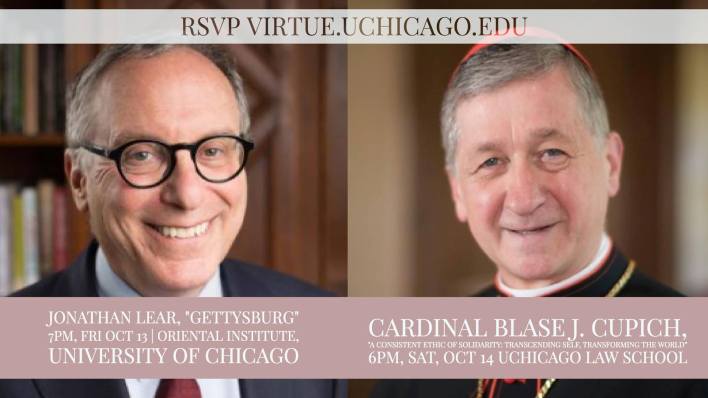
Remember to RSVP for each keynote! Jonathan Lear on October 13 and Cardinal Cupich on October 14. http://virtue.uchicago.edu/capstone-conference

Remember to RSVP for each keynote! Jonathan Lear on October 13 and Cardinal Cupich on October 14. http://virtue.uchicago.edu/capstone-conference

We’re presenting a short series of abstracts of the work-in-progress our scholars presented and discussed at their June 2017 Working Group Meeting.
David Shatz is Ronald P. Stanton University Professor of Philosophy, Ethics, and Religious Thought, Yeshiva University,
Because law plays a central role in Judaism, one initially assumes that its code of conduct is best characterized as an act morality rather than agent morality. In addition, one expects questions about proper conduct to be answered by rabbinic authorities formalistically– by derivation of the law from existing precedent laws by use of analogies. At their core, these expectations about Jewish ethics are correct. My aim in this paper, however, is to explore to what extent Jewish ethics can be characterized as well as an agent morality– that is, how, in Jewish tradition, considerations of virtue do or do not impact on norms and how they do or do not override formalistic derivations of proper conduct. The topic itself is not new, but I aim at a synthesis, analysis, and critique that is somewhat distinctive.
It must be said at the outset that Jewish tradition pays close attention to developing virtues. Indeed the literature on virtue is immense. Most famously, we have Maimonides’ work Eight Chapters, which is largely about virtue, and a section of his monumental legal code Mishneh Torah titled “Laws of Character Traits,” Medieval pietistic literature is a goldmine for explorations of character, and the Musar (translation: ethical) movement in the 19th century addressed in prodigious detail what traits are desirable and how to acquire them. Humility, faith, self-control, fear of heaven, love, kindness, compassion, altruism—these and more are foci of the huge virtue ethics literature in Judaism. The question is how this high regard for virtue, this spotlight on agent-morality, interacts with the rule-centeredness act-morality of Jewish law (Hebrew: Halakhah).
In particular, I want to show how the following theses about the law-virtue relationship appear in Jewish texts, and to explore some questions and disagreements surrounding them.
1) Some biblical laws are based on the desire to inculcate certain virtues and not on the belief that the actions proscribed or prescribed are in and of itself objectionable.
2) At times doing the right thing may diminish one’s character. (I’ll call this the problem of moral attrition.)
3) At times, doing the right thing reflects a character flaw—some right actions are such that a good person wouldn’t do them.
4) A concern for virtue expands the parameters of obligation.
5) Actions “bein adam la-havero” (=between two people, such as a giver of charity and a recipient) should not be motivated by submission to rules but rather should flow from inclinations (pace Kant).
Such claims appear in general philosophical literature, and the paper will utilize some of that material in examining the Jewish texts.

Call both one’s efforts at being a good person and the ways of thinking, feeling, and responding to circumstances that develop while one works to be a good person ‘virtue.’ Let ‘human happiness’ pick out a pattern in one’s life marked by such connected and interrelated goods as love, health, strong family ties and friendships, intellectual engagement, interesting work, a reasonable measure of material security, optimism for one’s future, and availability to experiences of joy and peace. On some traditional views, the development and exercise of good character—of virtue—is supposed to be enough to guarantee happiness. On other views, traditional and more modern, virtue and happiness can come apart. Both sorts of view share the idea that people want happiness. Both sorts of view share the understanding that acting well can be costly. In this talk, I will trace some of the tensions between virtue and happiness, urging that, while there may be no guarantee that the living will be easy when we work to be good human beings, the kinds of temporal happiness we can enjoy are only worth going for in the context of our efforts to be good people.
In this talk, I will think about bad things, and the ways in which we can apprehend and consider what is bad—both the kind of badness at issue in so-called “natural evils” like illness, injury, and some forms of suffering, and so-called “moral evils”—like injustice (with the understanding that moral evil can sometimes show itself in manmade natural evil). It can seem like both sorts of bad function completely independently of the goods that they block, impede, prevent, or otherwise sabotage. It can seem that way even if we don’t have unproblematic access to an account of what overall good might look like in the relevant area of human experience, life, or action. I will take seriously the difficulty of giving an account of all-around goodness in specific areas of life, experience, and action, and argue that, nevertheless, any understanding of badness is parasitic on a grasp—however inchoate or indeterminate—of good.


Join us for our “capstone” conference, which will feature talks, panels, and discussions with the philosophers, religious thinkers, and psychologists who have been working together to investigate whether self-transcendence helps to make ordinary cultivation and exercise of virtue a source of deep happiness and meaning in human life.
The conference is free and open to the public. For the full schedule and addresses of events, visit https://virtue.uchicago.edu/capstone-conference
Online registration for attendance at each keynote talk is separate and required (see links below).
9:15am Welcome by Principal Investigators Jennifer Frey and Candace Vogler
9:30-10:30 Kristján Kristjánsson, Professor of Character Education and Virtue Ethics; Deputy Director of the Jubilee Centre for Character and Virtues, University of Birmingham
10:45-11:45 Dan P. McAdams, Henry Wade Rogers Professor of Psychology and Professor of Human Development and Social Policy, Northwestern University
1:45 – 2:45 pm Panel: Transcending Boundaries I
Talbot Brewer, Professor of Philosophy, University of Virginia and Faculty Fellow at the Institute for Advanced Studies in Culture
Michael Gorman, Associate Professor of Philosophy, School of Philosophy, The Catholic University of America
Jean Porter, John A. O’Brien Professor of Theology, University of Notre Dame
3:00 -4:00 pm: Tahera Qutbuddin, Professor of Arabic Literature, University of Chicago
4:15 – 5:15 Panel: Virtue, Happiness, & the Meaning of Life Visiting Scholars
Fr. Stephen Brock, Professor of Medieval Philosophy, Pontifical University of the Holy Cross, Rome
Anselm Mueller, University of Trier
7pm – Keynote: Jonathan Lear, Oriental Institute, Breasted Hall | Registration required
9:00 – 10:00 am Owen Flanagan, James B. Duke Professor of Philosophy, Duke University
10:15-11:15 Angela Knobel, Associate Professor of Philosophy, School of Philosophy, The Catholic University of America
11:30-12:30 – Matthias Haase, Assistant Professor of Philosophy, University of Chicago
1:30-2:30p Panel Transcending Boundaries II
Erik Angner, Associate Professor of Practical Philosophy, Stockholm University
Heather C. Lench, Associate Professor of Psychology and Department Head, Texas A&M University
Marc G. Berman, Assistant Professor in the Department of Psychology and Director, Environmental Neuroscience Laboratory, University of Chicago
Robert C. Roberts, Professor of Ethics and Emotion Theory at the Jubilee Centre for Character and Virtues, and joint Chair with the Royal Institute of Philosophy
3:45-4:45 Nancy Snow, Director of the Institute for the Study of Human Flourishing, University of Oklahoma
6pm – Keynote, Cardinal Blaise Cupich, Law School Auditorium | Registration required
This event is made possible by a generous grant from the John Templeton Foundation.
Thank you to our conference co-sponsors: The Chicago Center for Practical Wisdom, the Committee on Social Thought, the Lumen Christi Institute, the Martin Marty Center, the Neubauer Collegium for Culture and Society, the University of Chicago Department of Philosophy, the University of Chicago Divinity School, and the University of Chicago Division of Humanities.

We’re presenting a short series of abstracts of the work-in-progress our scholars presented and discussed at their June 2017 Working Group Meeting.
Robert C. Roberts is Professor of Ethics and Emotion Theory at the Jubilee Centre for Character and Virtues, and joint Chair with the Royal Institute of Philosophy. Michael Spezio is Associate Professor of Psychology & Neuroscience and head of the Laboratory for Inquiry into Valuation and Emotion (LIVE) at Scripps College in Claremont, CA.
After living for a significant period in l’Arche communities, people often experience a change of self-other concept. It is a character change in which, from conceiving self-other in a way that is typical for modern secular societies, members’ experience of self in relation to others is transformed under the reign of what we call humble love. Both before and after the transformation, the experience of self-other has the character of concern-based construal, but the terms of the two kinds of construal are mutually contrary. Following Jean Vanier, we call the ethos guiding the first self-other style of construal “the Normal” (he writes of “the tyranny of the Normal”). The leading concepts on which this ethos turns are success, competence, competition, advancement, achievement, power, superior-inferior, rival, reputation/recognition/ acclaim, and the like, as criteria for the evaluation of persons. Here the self is seen as in relation to the other/ others, but the relations are distancing, alienating, ones of rivalry, differential competence, superior achievement, competition for power, winner and loser, etc. The relations are not those within a community, in the strict sense, but rather within a social arena of agonistic differentiation. By contrast, the terms of self-other construals that are fostered by long-term living in l’Arche are characterized by commonality, mutuality, and reconciliation: brother/sister, friend, helper, colleague, forgiveness, love. Humble love combines two highly congruent and complementary virtues: humility and charity. The tyranny of the Normal erects “walls” that impede the mutuality construals of self-other that are characteristic of love. Humility, which dissipates or undermines the distancing, alienating self-other construals, brings down these walls, making way for the genuine communion of love with its characteristic self-other construals.

Candace Vogler will give a talk September 15 at Valparaiso University as part of their programming on the theme of the pan-humanities seminar taken by every freshman, and the theme this fall is “human meaning and purpose.” She will be hosted by the Department of Philosophy at Valparaiso University.
Call both one’s efforts at being a good person and the ways of thinking, feeling, and responding to circumstances that develop while one works to be a good person ‘virtue.’ Let a ‘meaningful’ life be a life imbued with a sense of purpose or significance—a life that is full, engaging, and engaged, where the fulness comes of something more than mere subjective interest and enthusiasm. It can seem as though virtue and meaning have very little to do with each other. Whatever sort of struggle might be involved in working to be a good human being can seem like something personal—an individual quest to have a beautiful character or a shining soul. Having a meaningful life, on the other hand, looks like the sort of thing that will require that I go beyond the business of working toward having a lovely soul and into a larger world where I try to find things that are genuinely worth pursuing, and devote myself to their pursuit. In this talk, I will work to bring the two together, partly by urging a different account of virtue, partly by developing a slightly more articulate account of meaning in human life, and always by drawing on work by Thomas Aquinas.
 Our principal investigator Candace Vogler will be at Tulane University on Monday, September 18 to give a talk on finding happiness. She will be hosted by the Thomistic Institute Graduate Chapter at Tulane University.
Our principal investigator Candace Vogler will be at Tulane University on Monday, September 18 to give a talk on finding happiness. She will be hosted by the Thomistic Institute Graduate Chapter at Tulane University.
According to an ancient truism that I have no interest in challenging, people want happiness. According to more contemporary thought on the topic, in seeking love, wealth, health, friendship, adventure, something that counts as family, some sort of supportive community, interesting work, and the kinds of security associated with these things, people are seeking happiness. Alongside these goods, people sometimes take an interest goods that go beyond the stuff of personal well-being and the well-being of those in their immediate proximity. They want to be good people. They want to play the good that they enjoy forward in some area of human life. They want to work for social justice, say, or for other good causes. But according to the ancient truism that understands this human busy-ness as directed at happiness, genuine happiness shows itself in complete satisfaction. Drawing on the thought of Thomas Aquinas, I will urge that it is folly to think that a very good life will all by itself be completely satisfying. While allowing that sources of temporal happiness really are sources of happiness, I will suggest that human life points beyond itself to a kind of spiritual good that we cannot secure on our own.
Kami adalah bintang utama di dunia togel online, diakui secara internasional dan di seluruh Asia! Dengan kualitas yang luar biasa, komitmen kuat, dan profesionalisme yang tak tergoyahkan, Bandar Togel telah menjaga reputasi ini selama bertahun-tahun di dunia judi toto togel. Mari bergabung dan rasakan semangat serta kualitas terbaik bersama kami!
Situs togel online resmi yang menawarkan pasaran Hongkong menjadi salah satu pilihan Toto Togel aman dan terpercaya bagi pemain. Dengan metode deposit yang fleksibel seperti Dana, pemain dapat dengan mudah menyetorkan modal mereka tanpa kesulitan. Pasaran HK menawarkan hasil yang adil dan cepat, menjadikannya salah satu pasaran yang paling diminati oleh para pemain togel.
Kemudahan transaksi menjadi salah satu alasan pemain memilih situs togel tertentu. Dengan pilihan deposit menggunakan Dana dan Gopay, beberapa Togel Terbesar menawarkan proses yang cepat dan aman untuk pemain, sekaligus menyediakan pasaran lengkap dengan peluang besar.
Patch kali ini juga ngubah AI musuh yang bikin gameplay lebih menantang saat Togel. Banyak game online menyediakan fitur friend list. Ini memudahkan pemain mengundang teman bermain.
Patch kecil kemarin ternyata memperbaiki glitch penting yang sering dimanfaatkan pemain, penjelasan lengkapnya bisa kamu lihat melalui toto. Mode latihan cocok buat uji mekanik baru. Gunakan sebelum masuk ranked biar lebih siap.
Menang di Bo Togel bukan hanya tentang keberuntungan; ada strategi yang dapat meningkatkan peluang Anda secara signifikan. Dari memilih nomor yang tepat hingga memahami pasaran yang paling menguntungkan, artikel ini akan membahas strategi terbaik untuk meraih Bo Togel Hadiah Terbesar. Dengan sedikit perencanaan dan analisis, Anda dapat meningkatkan kesempatan untuk meraih kemenangan besar di Bo Togel.
Banyak pemain togel yang mengandalkan hasil Keluaran Macau untuk merumuskan angka taruhan mereka. Hasil ini biasanya diumumkan secara resmi dan mencakup berbagai pasaran. Dengan mengecek keluaran Macau, pemain dapat menentukan angka terbaik untuk taruhan berikutnya.
Tidak hanya sekadar angka, tetapi Keluaran Macau juga menjadi alat analisis bagi bettor yang serius dalam bermain togel. Banyak pemain yang mencatat angka-angka yang keluar setiap hari untuk mencari tren tertentu yang bisa digunakan sebagai referensi taruhan berikutnya. Semakin cepat mereka mendapatkan informasi mengenai hasil keluaran, semakin baik pula mereka bisa mempersiapkan strategi taruhan.
Patch terbaru bikin beberapa konten lama relevan lagi dan layak dimainkan ulang menurut toto. Tips bermain konsisten lebih efektif daripada maraton sesekali. Progres jadi stabil.
Skin eksklusif rank tinggi ini bikin tampilan makin beda dan syaratnya ada di toto togel. Update anti-cheat bikin permainan lebih adil. Pemain jujur jadi lebih nyaman.
Salah satu keuntungan bermain Toto Togel adalah adanya berbagai jenis taruhan yang bisa dipilih. Mulai dari taruhan 2D yang lebih mudah dimenangkan hingga taruhan 4D yang menawarkan hadiah terbesar. Dengan memilih jenis taruhan yang sesuai dengan strategi dan modal, pemain bisa meningkatkan peluang menang mereka.
Tidak ada momen yang lebih ditunggu selain saat keluaran macau diumumkan, sebab pengumuman itu menjadi penentu keberhasilan strategi sekaligus tantangan untuk putaran berikutnya.
Pengembang Link Slot Gacor seperti NetEnt dan Play'n GO terus berinovasi dengan menghadirkan permainan slot yang kaya grafis, efek suara yang memukau, serta animasi yang memikat.
Salah satu rahasia sukses dalam bermain slot adalah mengelola modal dengan baik. Tentukan batas taruhan dan sesuaikan dengan peluang di setiap putaran. Dengan strategi pengelolaan modal yang tepat, Anda dapat bermain lebih lama dan meningkatkan peluang menang tanpa perlu mengorbankan terlalu banyak dana. Selain itu, manfaatkan juga scatter hitam yang tersedia di dalam permainan slot mahjong ways 2 terbaru hari ini.
Saat ini, banyak situs judi online yang menyediakan Slot Depo 5k dengan peluang kemenangan yang besar. Dengan modal yang sangat kecil, pemain masih memiliki kesempatan untuk menang besar. Slot ini sangat cocok bagi mereka yang ingin bermain hemat namun tetap merasakan sensasi kemenangan besar.
RTP slot tertinggi menjadi daya tarik utama dalam dunia perjudian slot online, karena memberikan peluang menang yang lebih tinggi dibandingkan game dengan RTP rendah. Dengan memanfaatkan rtp live, pemain bisa mengetahui apakah sebuah slot gacor hari ini atau tidak. Slot rtp tertinggi hari ini sering kali menawarkan kesempatan menang yang lebih besar, sehingga sangat penting untuk selalu memperbarui informasi tentang rtp slot tertinggi hari ini. Ini membantu para pemain untuk mengambil keputusan yang tepat dalam memilih permainan.
Banyak pemain mencari situs slot yang menawarkan pengalaman bermain terbaik, dan Slot Toto berhasil memenuhi ekspektasi tersebut dengan fitur unggulan yang tidak dimiliki oleh platform lain. Salah satu kelebihan utama yang membuat situs ini begitu diminati adalah variasi game yang sangat luas, mulai dari slot klasik hingga slot modern dengan tema menarik.
Keunggulan lain dari Slot777 adalah keberagaman tema dan jenis permainan slot yang ditawarkan. Dengan berbagai tema menarik seperti petualangan, fantasi, dan mitologi, pemain bisa memilih permainan yang paling sesuai dengan selera mereka. Setiap permainan di Slot 777 menawarkan pengalaman bermain yang berbeda, membuat pemain tidak cepat merasa bosan.
Para pemain kini tak perlu khawatir soal modal, karena dengan hadirnya Slot Depo 10k, mereka dapat langsung bermain berbagai jenis slot populer dan ikut bersaing mendapatkan kemenangan besar tanpa harus mengeluarkan banyak uang.
Strategi cerdas sering kali dimulai dengan modal terbatas, dan ketika seseorang mencoba berbagai jenis permainan, slot bet kecil menjadi pilihan aman untuk memahami pola mesin tanpa kehilangan terlalu banyak uang.
Untuk suasana bermain yang berbeda, slot Thailand menghadirkan tema lokal yang unik, ditambah animasi dan soundtrack khas yang membuat setiap permainan lebih hidup dan menyenangkan bagi penggemar slot.
Turnamen PvP antar guild ini bakal jadi ajang adu gengsi, info pendaftaran lengkap tersedia pada togel. Komunitas game online bikin suasana main jadi lebih hidup. Banyak tempat buat ngobrol dan berbagi pengalaman.
Update ini bikin build tertentu jadi meta baru seperti yang ramai di toto slot. Update sistem anti-cheat bikin permainan lebih adil. Pemain jujur jadi lebih nyaman.
Patch note terbaru ada perubahan cooldown yang penting, detailnya ada pada Togel Online. Komunitas game sering ngadain giveaway kecil. Lumayan kalau kamu hoki.
Event spesial kasih kesempatan dapet item yang biasanya mahal, cara farm-nya bisa kamu cek di toto slot. Jangan lupa belajar counter hero atau karakter tertentu. Ini penting banget buat ranked.
Turnamen PvP bakal pakai format baru yang lebih seru, formatnya bisa kamu cek di togel. Komunitas yang aktif biasanya punya jadwal mabar rutin. Ikut aja biar makin sering latihan.
Aktivitas yang menguji keberuntungan dan strategi memang selalu menarik, dan ketika orang mencari permainan seru, mereka akhirnya mempertimbangkan Toto, karena memberikan pengalaman bermain yang menantang sekaligus menghibur.